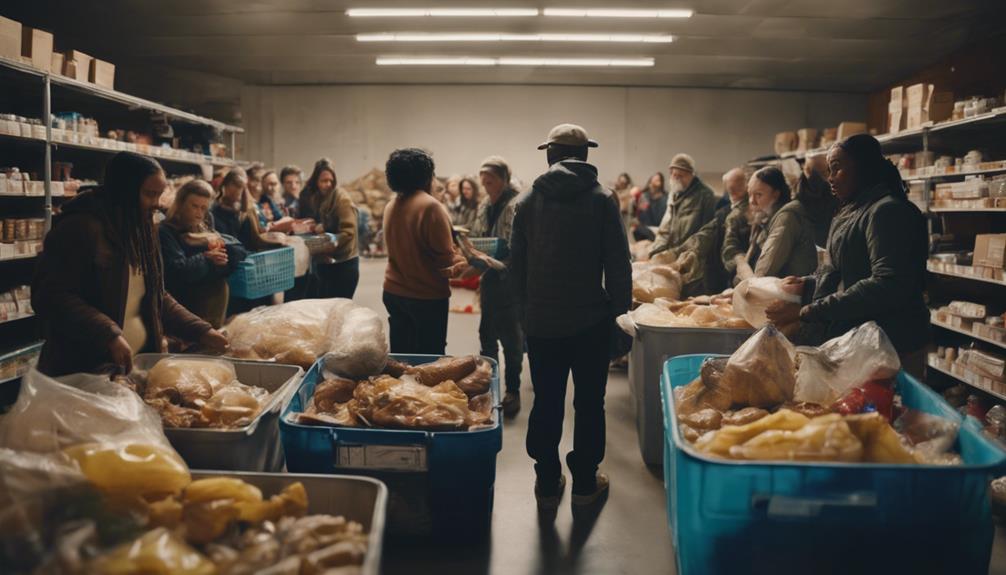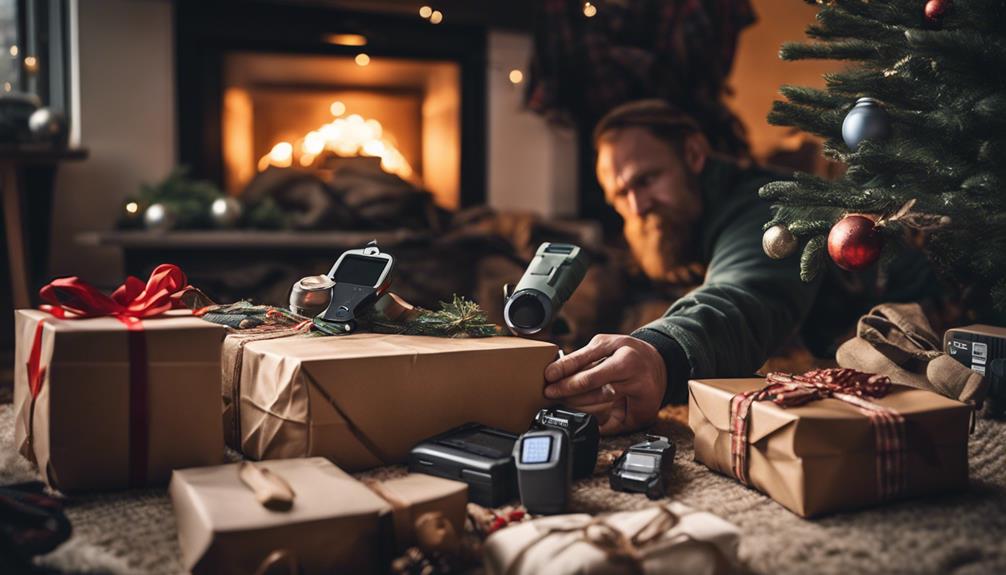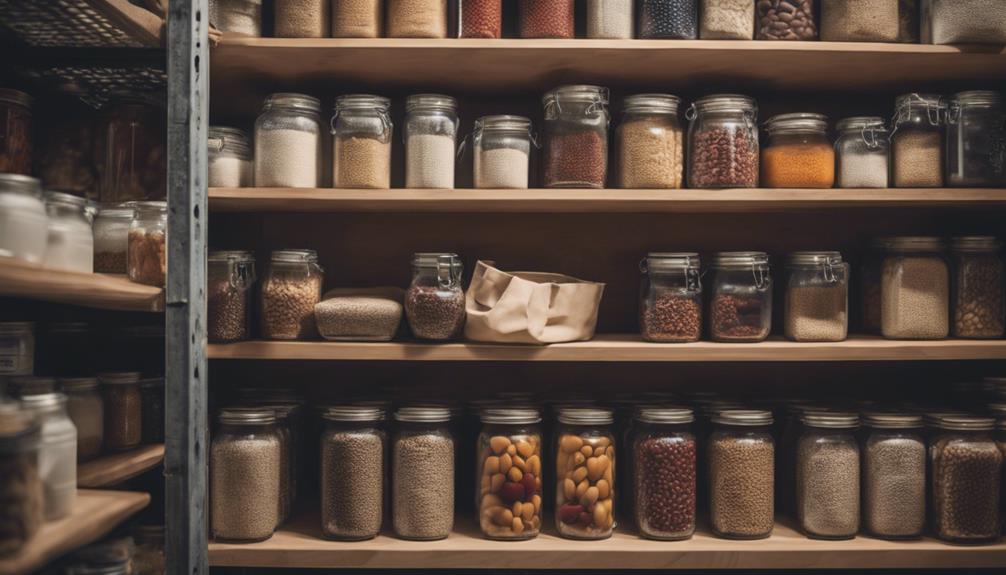Ever thought about who preppers are? They're folks ready for any situation, focusing on being self-sufficient and prepared. Rooted in historical events like the Cold War and Great Depression, preppers distrust government resources and plan for societal breakdown. Communities of diverse backgrounds come together, sharing skills like self-defense and sustainable living. Bug-in, bug-out, and homesteading techniques form their strategies. With one-third of US adults identifying as preppers, the movement is expanding globally. If you want to uncover more about their motivations, community dynamics, and safety priorities, you'll find a fascinating world waiting for you.
Key Takeaways
- Preppers are individuals who actively prepare for emergencies and disasters.
- They prioritize self-sufficiency, survival skills, and resource stockpiling.
- Preppers come from diverse backgrounds and ages.
- The survivalist movement emphasizes readiness, community support, and cooperation.
- Motivated by concerns about societal breakdown, natural disasters, or personal safety.
Origins of Prepping
During the Cold War era and the Great Depression, the origins of prepping emerged from historical roots emphasizing the importance of preparedness. Survivalist movements, fueled by concerns about nuclear threats, government policies, and economic instability, gained traction in the 1930s to 1950s.
The LDS Church played a significant role during the Cold War by advising its members on food storage, contributing to the culture of preparedness. Individuals began preparing for survival more actively in the 1960s, prompted by inflation, urban vulnerabilities, and fears of societal collapse.
Seminars on survival strategies during potential monetary collapses began in 1967, reflecting the growing interest in prepping. These historical events and movements laid the groundwork for modern-day prepping practices, highlighting the importance of being self-sufficient and ready for unforeseen circumstances.
The lessons learned from past crises continue to shape the mindset of preppers today, emphasizing the value of preparedness in an uncertain world.
Motivations Behind Prepping

The motivations behind prepping stem from a combination of distrust in government resources, concerns about societal breakdown, and personal experiences that drive individuals to prioritize preparedness for unforeseen emergencies. Many preppers feel a lack of confidence in the ability of government agencies to effectively respond to crises, leading them to take matters into their own hands.
Upbringing and past personal experiences also heavily influence individuals to start prepping, as exposure to emergencies or disasters can highlight the importance of being prepared. The core motivation for preppers is being ready for any emergency situation that may arise, whether it be a natural disaster, social unrest, or a pandemic.
Prepper Community Diversity

You'll explore the dynamics within the prepper community, where individuals from diverse backgrounds come together to share survival strategies and preparedness approaches.
From urban dwellers to rural homesteaders, preppers showcase a wide range of tactics aimed at ensuring self-reliance in times of crisis.
Understanding these varied approaches will provide insight into the resilience and adaptability of the prepper community.
Prepper Group Dynamics
Within the prepper community, diversity shines through in the various backgrounds, ages, and professions of its members. Preppers often gather at survivalist retreats, in online forums, local meetups, and social media groups to exchange knowledge and resources.
Community dynamics play an essential role in prepper groups, where individuals of all experience levels, from beginners to seasoned experts in survival skills, come together to collaborate on preparedness plans. These tight-knit networks foster a sense of camaraderie and mutual support among members.
The shared commitment to being self-sufficient in emergencies unites preppers in their goal of readiness. Whether sharing tips for survival scenarios or pooling resources for group preparedness, prepper group dynamics emphasize cooperation and collective resilience.
This collaborative spirit allows preppers to learn from one another, strengthen their readiness strategies, and build a supportive community that thrives on shared values of self-reliance and preparedness.
Varied Survival Strategies
Prepper community diversity manifests in the varied survival strategies members employ, encompassing bug-in, bug-out, and homesteading approaches. Bug-in strategies involve fortifying one's home with supplies and security measures to ride out emergencies without leaving. Bug-out preppers prioritize mobility and preparedness to evacuate quickly to a safe location in the event of a crisis. Homesteading preppers emphasize sustainable living practices such as gardening, raising livestock, and renewable energy sources.
| Survival Strategy | Description |
|---|---|
| Bug-In | Focuses on fortifying homes for emergencies |
| Bug-Out | Prioritizes mobility for quick evacuation |
| Homesteading | Emphasizes sustainable living practices |
Diverse Preparedness Approaches
The prepper community's diverse preparedness approaches reflect a wide array of motivations and experiences. Some preppers prioritize self-reliance, focusing on developing skills that would allow them to survive independently in various scenarios.
Others concentrate on honing survival skills, such as foraging or shelter-building, to navigate unfamiliar or hostile environments. Additionally, certain preppers place a significant emphasis on stockpiling resources like food, water, and medical supplies to guarantee they've the necessary provisions during times of crisis.
This variety of approaches within the prepper community stems from individual beliefs and concerns, shaping how each person prepares for potential emergencies. Factors like geographical location, family dynamics, and personal beliefs further contribute to the diversity of preparedness strategies among preppers.
From creating bug-out bags for quick evacuation to establishing off-grid homesteads for long-term self-sufficiency, preppers engage in a spectrum of activities tailored to their unique approach to survival readiness.
Practical Readiness Strategies

Get ready to bolster your preparedness game with essential supplies checklist, emergency plan basics, and self-defense techniques.
These practical readiness strategies are essential for managing crisis situations with confidence and resilience.
Let's equip you with the tools and knowledge needed to enhance your readiness skills.
Essential Supplies Checklist
Prioritizing practical preparedness, ensuring you have the essential supplies is important for ensuring your readiness in emergency situations. When preparing, make sure to include a well-stocked first aid kit containing bandages, medications, and supplies for treating injuries.
Head to the local grocery store to gather non-perishable food items, water, and hygiene products to sustain yourself during crises. Additionally, consider communication tools like radios, flashlights, batteries, and solar chargers to stay connected with others.
Survival gear such as fire starters, multi-tools, tents, sleeping bags, and protective clothing are essential for shelter and safety. Don't forget to keep important documents, cash, and personal identification in waterproof containers for quick access when needed.
For added security, some preppers include tools for self-defense like pepper spray, firearms, and ammunition in their essential supplies checklist. By being well-prepared with these supplies, you can increase your chances of staying safe and secure during emergencies.
Emergency Plan Basics
To guarantee your preparedness extends beyond supplies, focus on mastering the basics of creating and executing an effective emergency plan. Start by outlining detailed evacuation routes with multiple options in case primary routes are compromised.
Confirm that your emergency kit includes at least three days' worth of water, non-perishable food, first aid supplies, medications, and essential tools. Establish communication plans by designating meeting points for family members if separated during an emergency.
Regularly practice drills and review your emergency plan to maintain readiness for potential crises. Familiarize yourself with how to use the supplies in your kit and update them as needed.
Self-Defense Techniques
Mastering self-defense techniques is imperative for preppers to guarantee their safety and security in emergency situations. Preppers often learn a variety of self-defense techniques to protect themselves and their supplies.
Here are some essential self-defense strategies preppers focus on:
- Hand-to-Hand Combat: Preppers train in hand-to-hand combat techniques to defend themselves when weapons aren't available or practical.
- Firearms Training: Learning how to safely and effectively use firearms is vital for preppers to protect themselves and their resources.
- Situational Awareness: Developing keen situational awareness skills helps preppers anticipate and respond to potential threats effectively.
Importance of Self-Sufficiency

Emphasizing self-sufficiency is a fundamental aspect of prepping for survivalists. Being prepared for emergencies means developing essential skills and reducing reliance on external resources. Here's a breakdown of how self-sufficiency plays an essential role in the prepping world:
| Self-Sufficiency | Emergency | Skills |
|---|---|---|
| Stockpiling food, water, and supplies | Ensuring survival during crises | Acquiring gardening, hunting, and first aid skills |
| Investing in alternative energy sources | Minimizing dependence on external systems | Developing self-reliance |
| Building shelters, bunkers, and retreats | Being prepared for any crisis scenario | Fortifying survival capabilities |
Preppers understand that self-sufficiency is not just a mindset but a way of life. By honing these skills and strategies, they aim to maintain independence and readiness in the face of adversity.
Growth of the Prepper Movement

Understanding the growth of the prepper movement sheds light on the increasing number of individuals actively engaging in preparedness activities worldwide. The prepper culture, once considered primarily an American phenomenon, is gaining popularity globally. This surge in interest is evident through various statistics:
- One-third of US adults identify as preppers, contributing to the substantial $11 billion annual expenditure on prepping activities.
- Gen Z individuals, with 40% identifying as preppers, represent the demographic most inclined towards preparedness.
- FEMA reports a 50% increase in self-reliant individuals from 2017 to 2020, showcasing the rapid growth of the prepper movement.
This shift from a niche hobby to a mainstream lifestyle choice signifies the expanding reach of prepping beyond its initial boundaries. As the movement continues to attract individuals from diverse backgrounds, the perception of preppers is evolving, highlighting the relevance of preparedness in today's uncertain world.
Challenging Stereotypes

Challenging stereotypes, preppers actively resist being pigeonholed by media portrayals and showcase diverse backgrounds and motivations for their preparedness activities.
Rather than fitting into a single mold, preppers come from various walks of life, bringing unique perspectives and reasons for their preparedness mindset.
Some preppers are driven by concerns about societal breakdown, while others focus on readiness for natural disasters or personal safety.
Each individual's background and experiences greatly influence their decision to engage in prepping, emphasizing the personalized nature of this movement.
Emphasizing Personal Safety

Prioritizing personal safety, preppers actively prepare themselves for emergencies by stocking up on essential supplies and honing self-defense skills. They understand the importance of being ready to protect themselves and their loved ones in any crisis.
To achieve this, preppers focus on:
- Self-Defense Training: Preppers invest time and effort into learning self-defense techniques to defend against potential threats effectively.
- Emergency Communication Devices: Ensuring access to reliable communication tools like radios is essential for staying informed and connected during emergencies.
- Sustainable Self-Sufficiency: Preppers aim to be self-reliant by having the necessary resources to sustain themselves for an extended period without external assistance.
Frequently Asked Questions
Are Preppers and Survivalists the Same?
Preppers and survivalists are similar in their goal of preparing for emergencies. Preppers focus on a broad range of readiness, while survivalists often prepare for extreme scenarios and emphasize living off-grid. Both prioritize self-reliance.
What Is the Philosophy of Preppers?
If you're wondering about the philosophy of preppers, it's all about proactive readiness. They focus on stockpiling essentials, honing survival skills, and crafting solid contingency plans to guarantee safety and well-being during uncertain times.
What State Has the Most Preppers?
In the US, Idaho has the highest percentage of preppers, with 12.6% of the population identifying in this way. Utah follows closely behind with 11.4%. Factors like rural lifestyle and natural disaster risks influence this trend.
What Are the Traditions of Preppers?
When it comes to the traditions of preppers, they revolve around self-reliance, stockpiling supplies, and mastering survival skills. From gardening to building bunkers, preppers prioritize readiness for disasters of all kinds.
What Is the Survivalist Movement and Why Are Preppers a Part of It?
The American preppers top survivalists are individuals dedicated to preparing for potential emergencies, from natural disasters to societal collapse. The survivalist movement emphasizes self-reliance and sustainability, with preppers stockpiling food, water, and supplies, as well as learning essential skills like first aid and gardening for long-term survival.
Conclusion
So, now you know what preppers are all about.
While some may see them as extreme or paranoid, they're just regular people preparing for the unexpected.
Remember, it's better to be safe than sorry.
Who knows, maybe one day you'll thank a prepper for their foresight and readiness.
Stay safe out there!










